初中英语牛津译林版 九年级上册 Unit 1 Period 1 Comic strip & Welcome to the unit课件(32张PPT)
文档属性
| 名称 | 初中英语牛津译林版 九年级上册 Unit 1 Period 1 Comic strip & Welcome to the unit课件(32张PPT) | 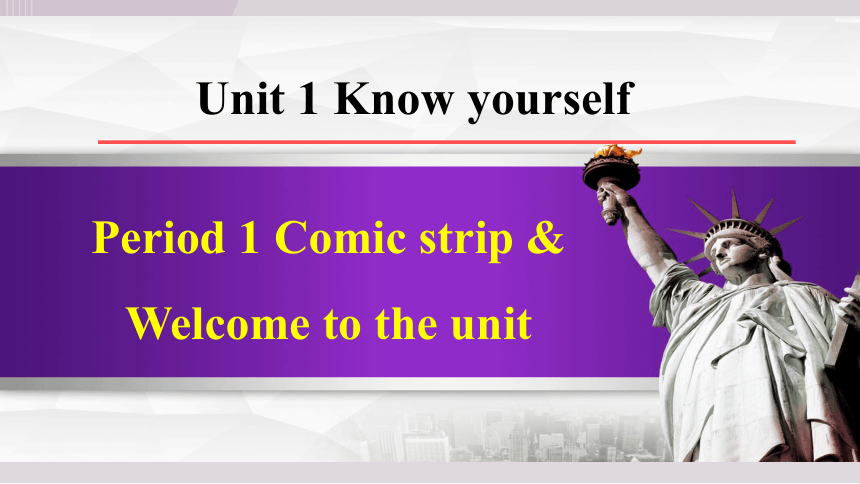 | |
| 格式 | pptx | ||
| 文件大小 | 1.3MB | ||
| 资源类型 | 教案 | ||
| 版本资源 | 牛津译林版 | ||
| 科目 | 英语 | ||
| 更新时间 | 2023-05-14 14:43:09 | ||
图片预览

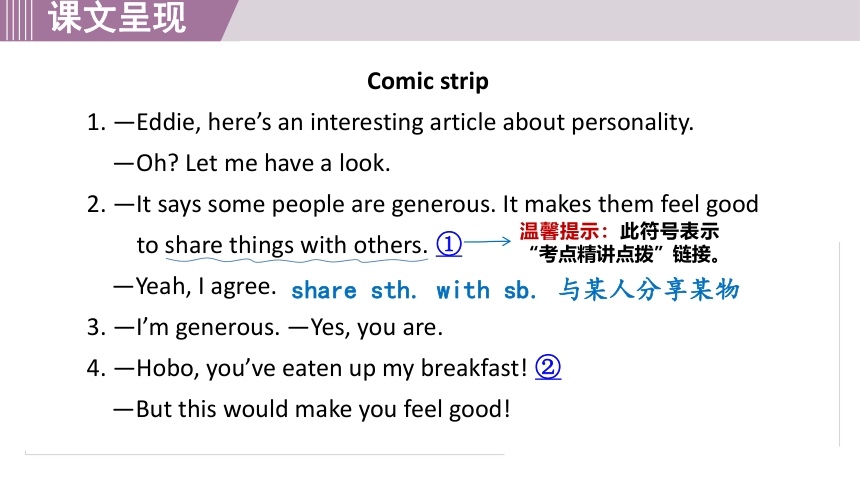
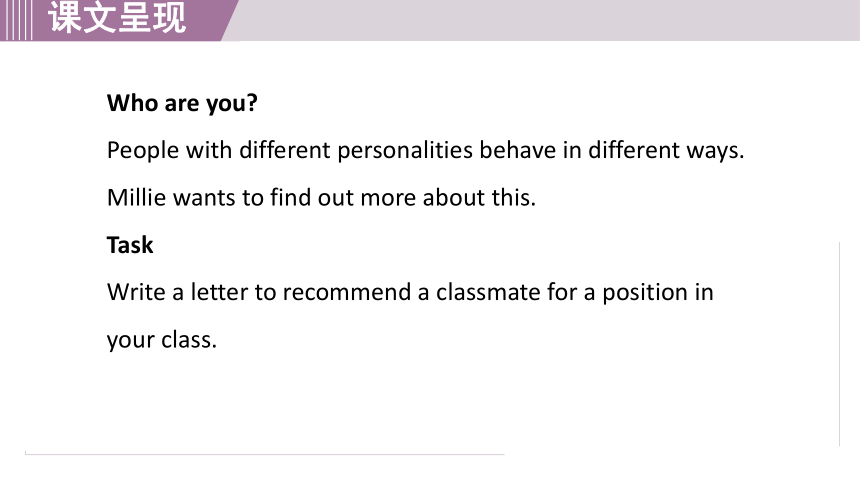

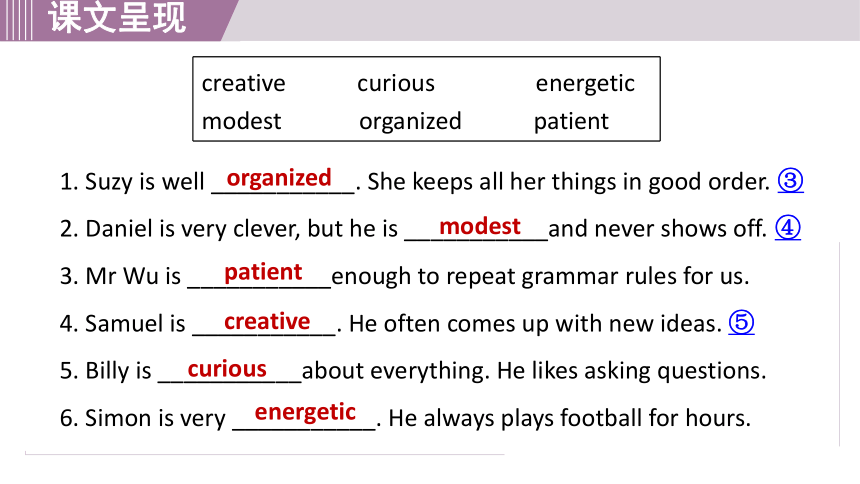
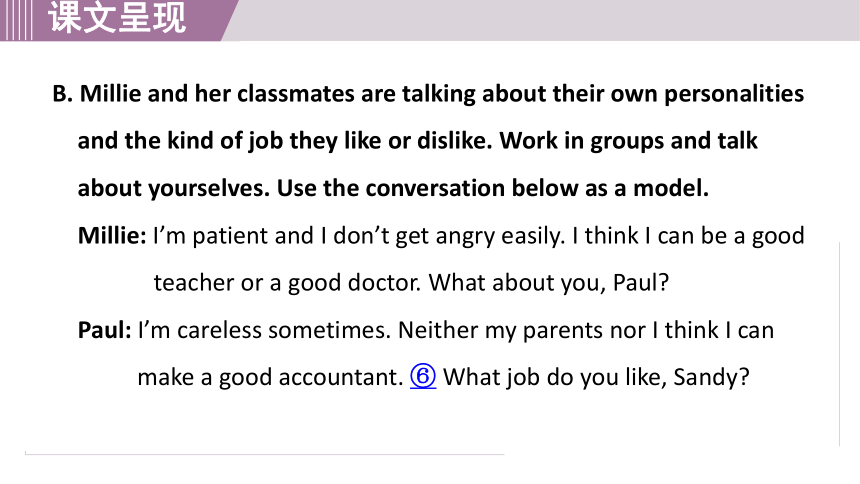
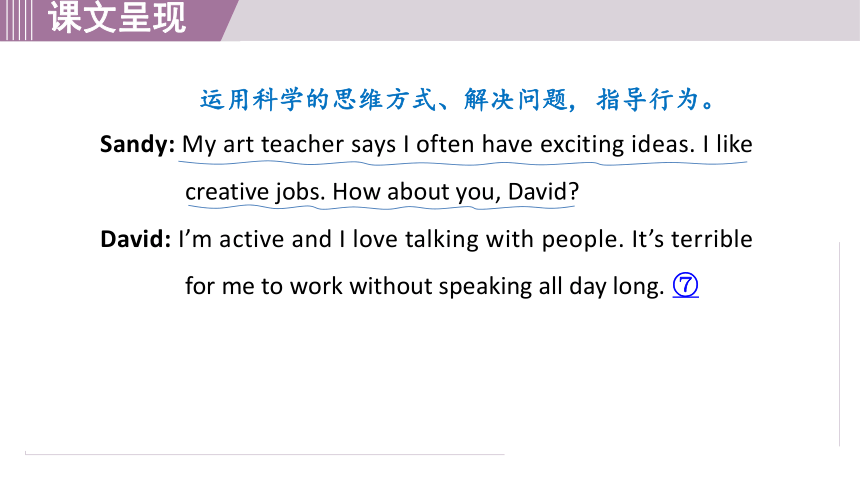
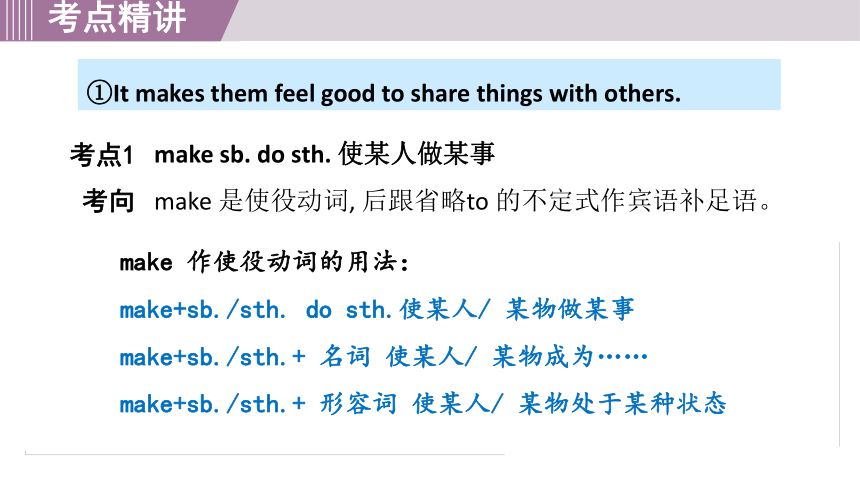
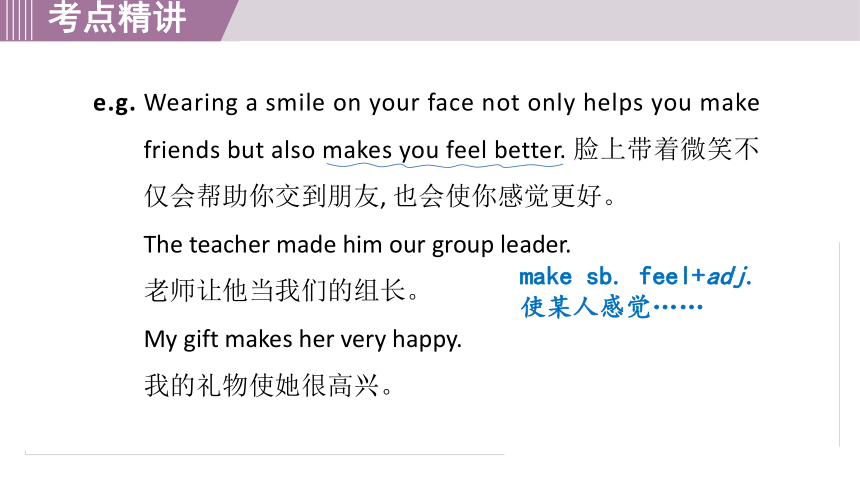
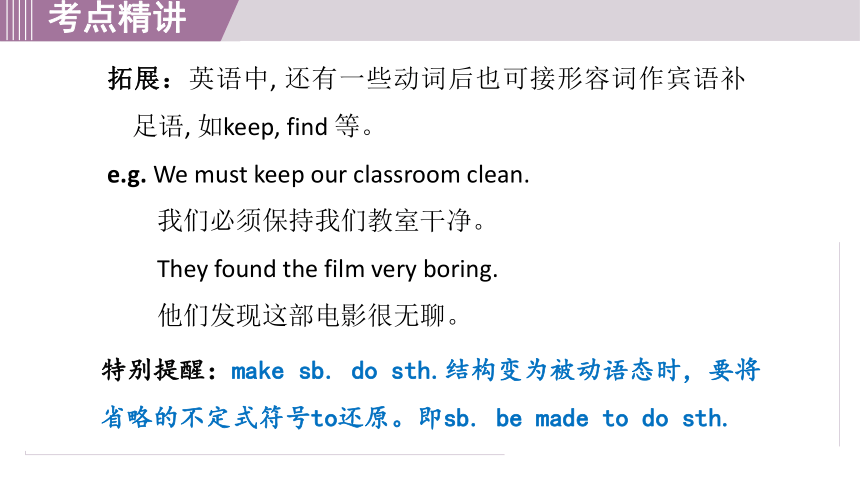
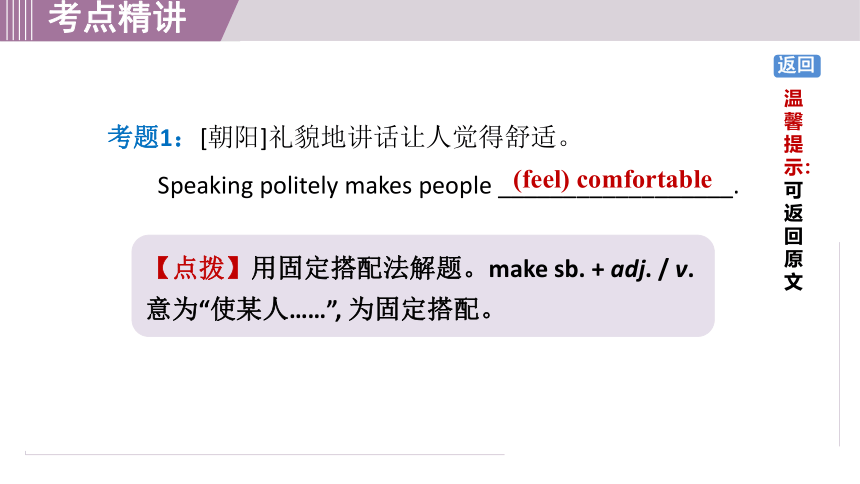
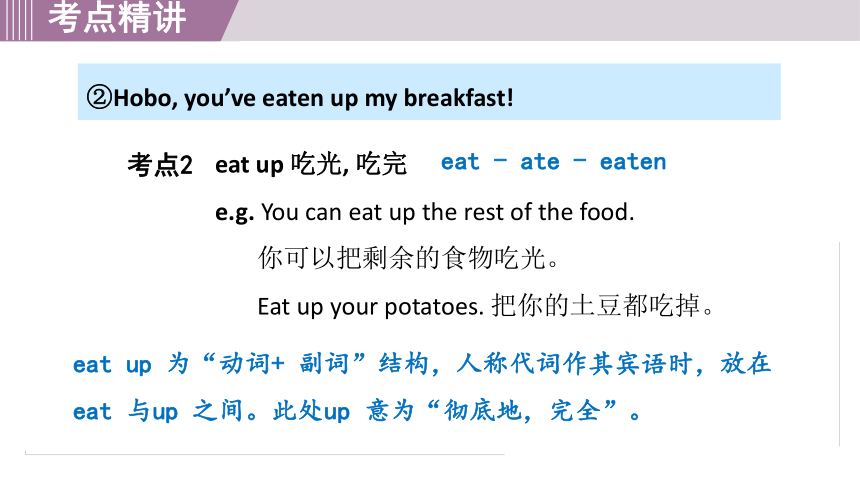
文档简介
(共32张PPT)
Period 1 Comic strip & Welcome to the unit
Unit 1 Know yourself
课文呈现
Comic strip
1. —Eddie, here’s an interesting article about personality.
—Oh Let me have a look.
2. —It says some people are generous. It makes them feel good to share things with others. ①
—Yeah, I agree.
3. —I’m generous. —Yes, you are.
4. —Hobo, you’ve eaten up my breakfast! ②
—But this would make you feel good!
share sth. with sb. 与某人分享某物
温馨提示:此符号表示“考点精讲点拨”链接。
课文呈现
Who are you
People with different personalities behave in different ways. Millie wants to find out more about this.
Task
Write a letter to recommend a classmate for a position in your class.
课文呈现
Personalities
A. Some words are often used to describe people’s personalities. Help Millie complete the following sentences with the words in the box.
Welcome to the unit
creative curious energetic
modest organized patient
动词形式为create, 意为“创作, 创建;引起”
课文呈现
1. Suzy is well ___________. She keeps all her things in good order. ③
2. Daniel is very clever, but he is ___________and never shows off. ④
3. Mr Wu is ___________enough to repeat grammar rules for us.
4. Samuel is ___________. He often comes up with new ideas. ⑤
5. Billy is ___________about everything. He likes asking questions.
6. Simon is very ___________. He always plays football for hours.
creative curious energetic modest organized patient
organized
modest
patient
creative
curious
energetic
课文呈现
B. Millie and her classmates are talking about their own personalities and the kind of job they like or dislike. Work in groups and talk about yourselves. Use the conversation below as a model.
Millie: I’m patient and I don’t get angry easily. I think I can be a good teacher or a good doctor. What about you, Paul
Paul: I’m careless sometimes. Neither my parents nor I think I can make a good accountant. ⑥ What job do you like, Sandy
课文呈现
Sandy: My art teacher says I often have exciting ideas. I like creative jobs. How about you, David
David: I’m active and I love talking with people. It’s terrible for me to work without speaking all day long. ⑦
运用科学的思维方式、解决问题, 指导行为。
①It makes them feel good to share things with others.
make sb. do sth. 使某人做某事
make 是使役动词, 后跟省略to 的不定式作宾语补足语。
考点1
考向
make 作使役动词的用法:
make+sb./sth. do sth.使某人/ 某物做某事
make+sb./sth.+ 名词 使某人/ 某物成为……
make+sb./sth.+ 形容词 使某人/ 某物处于某种状态
e.g. Wearing a smile on your face not only helps you make friends but also makes you feel better. 脸上带着微笑不仅会帮助你交到朋友, 也会使你感觉更好。
The teacher made him our group leader.
老师让他当我们的组长。
My gift makes her very happy.
我的礼物使她很高兴。
make sb. feel+adj.
使某人感觉……
拓展:英语中, 还有一些动词后也可接形容词作宾语补足语, 如keep, find 等。
e.g. We must keep our classroom clean.
我们必须保持我们教室干净。
They found the film very boring.
他们发现这部电影很无聊。
特别提醒:make sb. do sth.结构变为被动语态时,要将
省略的不定式符号to还原。即sb. be made to do sth.
考题1:[朝阳]礼貌地讲话让人觉得舒适。
Speaking politely makes people __________________.
(feel) comfortable
【点拨】用固定搭配法解题。make sb. + adj. / v. 意为“使某人……”, 为固定搭配。
返回
温馨提示:可返回原文
②Hobo, you’ve eaten up my breakfast!
eat up 吃光, 吃完
e.g. You can eat up the rest of the food.
你可以把剩余的食物吃光。
Eat up your potatoes. 把你的土豆都吃掉。
考点2
eat - ate - eaten
eat up 为“动词+ 副词”结构,人称代词作其宾语时,放在
eat 与up 之间。此处up 意为“彻底地,完全”。
考题2:[自贡] —We should form the good habit of saving food now.
—I agree, so I always ______ the food I order.
A. eat up B. give up C. turn up
A
吃光 放弃 (音量) 调大
返回
③She keeps all her things in good order.
keep... in order 使……保持井然有序
e.g. She likes to keep everything in good order.
她喜欢把一切放得井井有条。
Keep quiet and listen to me. 安静, 听我说。
Don’t keep the windows closed all day long.
不要整天把窗户关着。
考点3
作名词,
意为“条理”。
They kept talking for a long time.
他们一直谈, 谈了很长时间。
I’m sorry to keep you waiting outside for so long.
对不起, 让你在外面久等了。
keep 的用法:
① keep+ 形容词 保持某种状态(其中keep 为连系动词)
② keep+ 宾语+ 形容词 使……保持某种状态
③ keep + doing sth. 一直做某事
④ keep+sb.+doing sth. 使某人不停地做某事
考题3:[常州] Jenny 总是注意着把一切保持得井然有序。
Jenny always __________________________________________.
pays attention to keeping everything in order
返回
④Daniel is very clever, but he is _____ and never shows off.
(高频) show off 炫耀;卖弄
show off 可单独使用, 也可接名词、 代词或从句作宾语。接人称代词时, 人称代词要放在show 和off 的中间。
考点4
考向
show-showed-shown
show 的其他常见短语:
① show sb. sth. = show sth. to sb.给某人看某物
② show sb. around sp.带领某人参观某地
③ show sb. the way to sp.给某人指到某地的路
④ show up 出现,露面
e.g. A modest person never shows off. 谦虚的人从不炫耀。
Let me show you my latest picture.
=Let me show my latest picture to you.
让我给你看看我最新的画作。
When you come to Beijing, I will show you around this city.
当你来北京的时候, 我会带你参观这个城市。
Tom showed a foreigner the way to the library.
汤姆给一个外国人指了去图书馆的路。
拓展:show 还可作名词, 意为“节目;演出”。
e.g. We watched a fashion show yesterday.
昨天我们看了一场时装表演。
show 作名词的相关短语:
on show 展出 a chat show 访谈节目
a fashion show 时装表演 a game show 竞赛节目
考题4:[宿迁] Each of us in our group wants to make friends with Gary, because he is modest and never ____.
A. shows off B. takes off
C. puts off D. gives off
A
返回
⑤He often comes up with new ideas.
come up with 想出(主意)
e.g. The woman came up with a great idea —lending books to children in exchange for trash.
这位妇女想出了一个好主意—借书给孩子们, 换取垃圾。
Maybe you can come up with a better design also.
也许您也能想出更好的设计来。
考点5
相当于think of,
后接名词或代词作宾语。
come 的常用短语
come from 来自
come back 回来
come down 崩塌
come on 加油;快点
come true 实现
come out 出版;出现;开花
考题5:[黄冈、孝感、咸宁]上个月, 他们想出了一些办法给年轻人提供更多就业岗位。(come)
They ________________ some ideas to offer the young more jobs last month.
came up with
返回
⑥Neither my parents nor I think I can make a good accountant.
(高频) neither... nor... 既不……也不……
e.g. I can give you neither an opinion nor any advice.
我既不能给你意见, 也不能提供任何建议。
Neither Sandy nor I am able to understand David.
桑迪和我都不能理解大卫。
考点6
neither...nor... 表示否定,用来连接两个并列的成分。当neither...nor... 连接两个并列成分作主语时,谓语动词应遵循“ 就近原则”。
拓展:neither 的其他用法:
用法 例句
neither 用作形容词, 表示“(两者) 都不”, 置于单数名词之前。 e.g. Neither answer is correct.
两个答案都不对。
neither 用作代词, 表示“两者都不, 双方均不”。常用于neither of... 结构中。 e.g. He answered neither of the letters. 他两封信都没回。
Neither of the cars was/were
damaged. 两部车都没有受损。
用法 例句
neither 用作副词, 意为“也 不”, 放在句首, 表示前面 否定的情况也适用于另一个人或物, 句子要采用部分倒装。此时也可用nor 替换。 e.g. —I don’t like this dress.
我不喜欢这件连衣裙。
—Neither/Nor do I.
我也不喜欢。
特别提醒:neither of+名词”作主语时,通常被视为
单数,但从意义上讲也可视为复数。
考题6:[遂宁] —I’d like to order something to drink. What would you like, coffee or cola
—______. Milk is OK.
A. Both B. Neither C. All D. Either
【点拨】本题用句意理解法。根据答语后面的“Milk is OK.”可推测对方“咖啡和可乐”两者都不想要。
B
考题7:[毕节] Neither Saturday nor Sunday _____ OK because I will be quite busy these two days.
A. are B. is C. am D. be
【点拨】本题用语法判定法。neither... nor... 连接两个并列成分作主语时, 谓语动词遵循“就近原则”, 因此be 动词与离其最近的主语Sunday 保持一致。
B
返回
⑦It’s terrible for me to work without speaking all day long.
It’s + adj. + for sb. to do sth. 对于某人来说做某事是……
e.g. It’s difficult for me to work out this maths problem.
对我来说解答出这道数学题太难了。
考点7
形容词表示动词不定式的特征,如easy, difficult,
dangerous, important 等。
拓展:It’s + adj. + of sb. to do sth. 意为“某人做某事是……”。这个句型中的形容词表示人的特征和品质, 如:kind, nice, clever, foolish, polite 等。
e.g. It’s wise of Daniel to work out the difficult maths problem.
丹尼尔真聪明, 做出了那道很难的数学题。
It为形式主语,真正的主语是后面的动词不定式短语。
考题8:[福建] It’s important for us ______ hard in order to have a better life.
A. work B. to work C. working
【点拨】本题用固定搭配法。It is+ 形容词+for sb. to do sth. “对于某人来说, 做某事是……的” , 为固定结构。
B
返回
本节课主要学习了:
重点单词:order, grammar, neither, nor
重点短语:eat up, keep...in order, show off, come up with, neither...nor..., grammar rules
Period 1 Comic strip & Welcome to the unit
Unit 1 Know yourself
课文呈现
Comic strip
1. —Eddie, here’s an interesting article about personality.
—Oh Let me have a look.
2. —It says some people are generous. It makes them feel good to share things with others. ①
—Yeah, I agree.
3. —I’m generous. —Yes, you are.
4. —Hobo, you’ve eaten up my breakfast! ②
—But this would make you feel good!
share sth. with sb. 与某人分享某物
温馨提示:此符号表示“考点精讲点拨”链接。
课文呈现
Who are you
People with different personalities behave in different ways. Millie wants to find out more about this.
Task
Write a letter to recommend a classmate for a position in your class.
课文呈现
Personalities
A. Some words are often used to describe people’s personalities. Help Millie complete the following sentences with the words in the box.
Welcome to the unit
creative curious energetic
modest organized patient
动词形式为create, 意为“创作, 创建;引起”
课文呈现
1. Suzy is well ___________. She keeps all her things in good order. ③
2. Daniel is very clever, but he is ___________and never shows off. ④
3. Mr Wu is ___________enough to repeat grammar rules for us.
4. Samuel is ___________. He often comes up with new ideas. ⑤
5. Billy is ___________about everything. He likes asking questions.
6. Simon is very ___________. He always plays football for hours.
creative curious energetic modest organized patient
organized
modest
patient
creative
curious
energetic
课文呈现
B. Millie and her classmates are talking about their own personalities and the kind of job they like or dislike. Work in groups and talk about yourselves. Use the conversation below as a model.
Millie: I’m patient and I don’t get angry easily. I think I can be a good teacher or a good doctor. What about you, Paul
Paul: I’m careless sometimes. Neither my parents nor I think I can make a good accountant. ⑥ What job do you like, Sandy
课文呈现
Sandy: My art teacher says I often have exciting ideas. I like creative jobs. How about you, David
David: I’m active and I love talking with people. It’s terrible for me to work without speaking all day long. ⑦
运用科学的思维方式、解决问题, 指导行为。
①It makes them feel good to share things with others.
make sb. do sth. 使某人做某事
make 是使役动词, 后跟省略to 的不定式作宾语补足语。
考点1
考向
make 作使役动词的用法:
make+sb./sth. do sth.使某人/ 某物做某事
make+sb./sth.+ 名词 使某人/ 某物成为……
make+sb./sth.+ 形容词 使某人/ 某物处于某种状态
e.g. Wearing a smile on your face not only helps you make friends but also makes you feel better. 脸上带着微笑不仅会帮助你交到朋友, 也会使你感觉更好。
The teacher made him our group leader.
老师让他当我们的组长。
My gift makes her very happy.
我的礼物使她很高兴。
make sb. feel+adj.
使某人感觉……
拓展:英语中, 还有一些动词后也可接形容词作宾语补足语, 如keep, find 等。
e.g. We must keep our classroom clean.
我们必须保持我们教室干净。
They found the film very boring.
他们发现这部电影很无聊。
特别提醒:make sb. do sth.结构变为被动语态时,要将
省略的不定式符号to还原。即sb. be made to do sth.
考题1:[朝阳]礼貌地讲话让人觉得舒适。
Speaking politely makes people __________________.
(feel) comfortable
【点拨】用固定搭配法解题。make sb. + adj. / v. 意为“使某人……”, 为固定搭配。
返回
温馨提示:可返回原文
②Hobo, you’ve eaten up my breakfast!
eat up 吃光, 吃完
e.g. You can eat up the rest of the food.
你可以把剩余的食物吃光。
Eat up your potatoes. 把你的土豆都吃掉。
考点2
eat - ate - eaten
eat up 为“动词+ 副词”结构,人称代词作其宾语时,放在
eat 与up 之间。此处up 意为“彻底地,完全”。
考题2:[自贡] —We should form the good habit of saving food now.
—I agree, so I always ______ the food I order.
A. eat up B. give up C. turn up
A
吃光 放弃 (音量) 调大
返回
③She keeps all her things in good order.
keep... in order 使……保持井然有序
e.g. She likes to keep everything in good order.
她喜欢把一切放得井井有条。
Keep quiet and listen to me. 安静, 听我说。
Don’t keep the windows closed all day long.
不要整天把窗户关着。
考点3
作名词,
意为“条理”。
They kept talking for a long time.
他们一直谈, 谈了很长时间。
I’m sorry to keep you waiting outside for so long.
对不起, 让你在外面久等了。
keep 的用法:
① keep+ 形容词 保持某种状态(其中keep 为连系动词)
② keep+ 宾语+ 形容词 使……保持某种状态
③ keep + doing sth. 一直做某事
④ keep+sb.+doing sth. 使某人不停地做某事
考题3:[常州] Jenny 总是注意着把一切保持得井然有序。
Jenny always __________________________________________.
pays attention to keeping everything in order
返回
④Daniel is very clever, but he is _____ and never shows off.
(高频) show off 炫耀;卖弄
show off 可单独使用, 也可接名词、 代词或从句作宾语。接人称代词时, 人称代词要放在show 和off 的中间。
考点4
考向
show-showed-shown
show 的其他常见短语:
① show sb. sth. = show sth. to sb.给某人看某物
② show sb. around sp.带领某人参观某地
③ show sb. the way to sp.给某人指到某地的路
④ show up 出现,露面
e.g. A modest person never shows off. 谦虚的人从不炫耀。
Let me show you my latest picture.
=Let me show my latest picture to you.
让我给你看看我最新的画作。
When you come to Beijing, I will show you around this city.
当你来北京的时候, 我会带你参观这个城市。
Tom showed a foreigner the way to the library.
汤姆给一个外国人指了去图书馆的路。
拓展:show 还可作名词, 意为“节目;演出”。
e.g. We watched a fashion show yesterday.
昨天我们看了一场时装表演。
show 作名词的相关短语:
on show 展出 a chat show 访谈节目
a fashion show 时装表演 a game show 竞赛节目
考题4:[宿迁] Each of us in our group wants to make friends with Gary, because he is modest and never ____.
A. shows off B. takes off
C. puts off D. gives off
A
返回
⑤He often comes up with new ideas.
come up with 想出(主意)
e.g. The woman came up with a great idea —lending books to children in exchange for trash.
这位妇女想出了一个好主意—借书给孩子们, 换取垃圾。
Maybe you can come up with a better design also.
也许您也能想出更好的设计来。
考点5
相当于think of,
后接名词或代词作宾语。
come 的常用短语
come from 来自
come back 回来
come down 崩塌
come on 加油;快点
come true 实现
come out 出版;出现;开花
考题5:[黄冈、孝感、咸宁]上个月, 他们想出了一些办法给年轻人提供更多就业岗位。(come)
They ________________ some ideas to offer the young more jobs last month.
came up with
返回
⑥Neither my parents nor I think I can make a good accountant.
(高频) neither... nor... 既不……也不……
e.g. I can give you neither an opinion nor any advice.
我既不能给你意见, 也不能提供任何建议。
Neither Sandy nor I am able to understand David.
桑迪和我都不能理解大卫。
考点6
neither...nor... 表示否定,用来连接两个并列的成分。当neither...nor... 连接两个并列成分作主语时,谓语动词应遵循“ 就近原则”。
拓展:neither 的其他用法:
用法 例句
neither 用作形容词, 表示“(两者) 都不”, 置于单数名词之前。 e.g. Neither answer is correct.
两个答案都不对。
neither 用作代词, 表示“两者都不, 双方均不”。常用于neither of... 结构中。 e.g. He answered neither of the letters. 他两封信都没回。
Neither of the cars was/were
damaged. 两部车都没有受损。
用法 例句
neither 用作副词, 意为“也 不”, 放在句首, 表示前面 否定的情况也适用于另一个人或物, 句子要采用部分倒装。此时也可用nor 替换。 e.g. —I don’t like this dress.
我不喜欢这件连衣裙。
—Neither/Nor do I.
我也不喜欢。
特别提醒:neither of+名词”作主语时,通常被视为
单数,但从意义上讲也可视为复数。
考题6:[遂宁] —I’d like to order something to drink. What would you like, coffee or cola
—______. Milk is OK.
A. Both B. Neither C. All D. Either
【点拨】本题用句意理解法。根据答语后面的“Milk is OK.”可推测对方“咖啡和可乐”两者都不想要。
B
考题7:[毕节] Neither Saturday nor Sunday _____ OK because I will be quite busy these two days.
A. are B. is C. am D. be
【点拨】本题用语法判定法。neither... nor... 连接两个并列成分作主语时, 谓语动词遵循“就近原则”, 因此be 动词与离其最近的主语Sunday 保持一致。
B
返回
⑦It’s terrible for me to work without speaking all day long.
It’s + adj. + for sb. to do sth. 对于某人来说做某事是……
e.g. It’s difficult for me to work out this maths problem.
对我来说解答出这道数学题太难了。
考点7
形容词表示动词不定式的特征,如easy, difficult,
dangerous, important 等。
拓展:It’s + adj. + of sb. to do sth. 意为“某人做某事是……”。这个句型中的形容词表示人的特征和品质, 如:kind, nice, clever, foolish, polite 等。
e.g. It’s wise of Daniel to work out the difficult maths problem.
丹尼尔真聪明, 做出了那道很难的数学题。
It为形式主语,真正的主语是后面的动词不定式短语。
考题8:[福建] It’s important for us ______ hard in order to have a better life.
A. work B. to work C. working
【点拨】本题用固定搭配法。It is+ 形容词+for sb. to do sth. “对于某人来说, 做某事是……的” , 为固定结构。
B
返回
本节课主要学习了:
重点单词:order, grammar, neither, nor
重点短语:eat up, keep...in order, show off, come up with, neither...nor..., grammar rules
